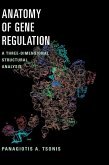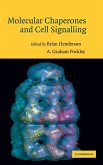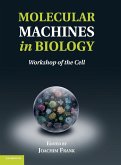Epigenomics
Herausgeber: Appasani, Krishnarao
Epigenomics
Herausgeber: Appasani, Krishnarao
- Gebundenes Buch
- Merkliste
- Auf die Merkliste
- Bewerten Bewerten
- Teilen
- Produkt teilen
- Produkterinnerung
- Produkterinnerung
Experts from academia and both the biotechnology and pharmaceutical industries introduce biological, medical and methodological aspects of the emerging field of epigenomics.
Andere Kunden interessierten sich auch für
![Anatomy of Gene Regulation Anatomy of Gene Regulation]() Panagiotis A. TsonisAnatomy of Gene Regulation234,99 €
Panagiotis A. TsonisAnatomy of Gene Regulation234,99 €![Molecular Chaperones and Cell Signalling Molecular Chaperones and Cell Signalling]() Brian Henderson / A. Graham Pockley (eds.)Molecular Chaperones and Cell Signalling148,99 €
Brian Henderson / A. Graham Pockley (eds.)Molecular Chaperones and Cell Signalling148,99 €![Molecular Machines in Biology Molecular Machines in Biology]() Molecular Machines in Biology160,99 €
Molecular Machines in Biology160,99 €![Biophysics and Biochemistry at Low Temperatures Biophysics and Biochemistry at Low Temperatures]() Felix FranksBiophysics and Biochemistry at Low Temperatures63,99 €
Felix FranksBiophysics and Biochemistry at Low Temperatures63,99 €![Wilson and Walker's Principles and Techniques of Biochemistry and Molecular Biology Wilson and Walker's Principles and Techniques of Biochemistry and Molecular Biology]() Andreas HofmannWilson and Walker's Principles and Techniques of Biochemistry and Molecular Biology51,99 €
Andreas HofmannWilson and Walker's Principles and Techniques of Biochemistry and Molecular Biology51,99 €![Biological Effects of Ultraviolet Radiation Biological Effects of Ultraviolet Radiation]() Walter HarmBiological Effects of Ultraviolet Radiation28,99 €
Walter HarmBiological Effects of Ultraviolet Radiation28,99 €![Comparative Physiology of the Heart Comparative Physiology of the Heart]() A. J. ClarkComparative Physiology of the Heart43,99 €
A. J. ClarkComparative Physiology of the Heart43,99 €-
-
-
Experts from academia and both the biotechnology and pharmaceutical industries introduce biological, medical and methodological aspects of the emerging field of epigenomics.
Hinweis: Dieser Artikel kann nur an eine deutsche Lieferadresse ausgeliefert werden.
Hinweis: Dieser Artikel kann nur an eine deutsche Lieferadresse ausgeliefert werden.
Produktdetails
- Produktdetails
- Verlag: Cambridge University Press
- Seitenzahl: 574
- Erscheinungstermin: 2. August 2012
- Englisch
- Abmessung: 250mm x 175mm x 35mm
- Gewicht: 1157g
- ISBN-13: 9781107003828
- ISBN-10: 1107003822
- Artikelnr.: 34889076
- Herstellerkennzeichnung
- Produktsicherheitsverantwortliche/r
- Europaallee 1
- 36244 Bad Hersfeld
- gpsr@libri.de
- Verlag: Cambridge University Press
- Seitenzahl: 574
- Erscheinungstermin: 2. August 2012
- Englisch
- Abmessung: 250mm x 175mm x 35mm
- Gewicht: 1157g
- ISBN-13: 9781107003828
- ISBN-10: 1107003822
- Artikelnr.: 34889076
- Herstellerkennzeichnung
- Produktsicherheitsverantwortliche/r
- Europaallee 1
- 36244 Bad Hersfeld
- gpsr@libri.de
List of contributors; Foreword; Preface; Part I. Basics of Chromatin
Biology and Biochemistry: 1. Introduction to epigenomics; 2. Epigenetics
and its historical perspectives; 3. Functional networks of human epigenetic
factors; 4. Nucleosome positioning in promoters: significance and open
questions; 5. Chemical reporters of protein methylation and acetylation; 6.
Long non-coding RNA in epigenetic gene silencing; Part II. Epigenomic
Imprinting and Stem Cells: 7. Active DNA demethylation - the enigma starts
in the zygote; 8. Histone modifications of lineage specific genes in human
embryonic stem cells during in vitro differentiation; 9. Epigenetic
stability of human pluripotent stem cells; 10. Impact of CpG methylation in
addressing adipose derived stem cell differentiation towards the cardiac
phenotype; 11. Regulation of stem cell epigenome by REST; 12. MicroRNAs in
embryonic stem cells; 13. Regulation of timing of replication; Part III.
Epigenomic Assays and Sequencing Technology: 14. Detection of CpG
methylation patterns by affinity capture methods; 15. Genome-wide ChIP-DSL
profiling of promoter methylation patterns associated with cancer and stem
cell differentiation; 16. Quantitative, high-resolution CpG methylation
assays on the pyrosequencing platform; 17. DNA methylation profiling using
Illumina BeadArray platform; 18. Advances in capillary
electrophoresis-based methods for DNA methylation analysis; 19. Genome-wide
methylome analysis based on new HT sequencing technology; 20. 3-D
quantitative DNA methylation imaging for chromatin texture analysis in
pharmacoepigenomics and toxicoepigenomics; Part IV. Epigenomics in Disease
Biology: 21. Cancer classification by genome-wide and quantitative DNA
methylation analyses; 22. Promoter CpG island methylation in colorectal
cancer: biology and clinical applications; 23. The epigenetic profile of
bladder cancer; 24. Genome-scale DNA methylation analyses of cancer in
children; 25. The epigenetics of facioscapulohumeral muscular dystrophy;
26. Modulating histone acetylation with inhibitors and activators; Part V.
Epigenomics in Neurodegenerative Diseases: 27. Study design considerations
in epigenetic studies of neuropsychiatric disease; 28. Epigenetic
regulation in human neurodevelopmental disorders including autism, Rett
syndrome and epilepsy; 29. The neurobiology of chromatin-associated
mechanisms in the context of psychosis and mood spectrum disorders; 30.
Genome-wide DNA methylation analysis in patients with familial ATR-X mental
retardation syndrome; 31. Kinases and phosphatases in the epigenetic
regulation of cognitive functions; Part VI. Epigenetic Variation,
Polymorphism and Epidemiological Perspectives: 32. Epigenetic effects of
childhood abuse on the human brain; 33. X-linked expressed SNPs and dosage
compensation; 34. Epigenomic diversity of colorectal cancer; 35. Epigenetic
epidemiology: transgenerational responses to the environment; Index.
Biology and Biochemistry: 1. Introduction to epigenomics; 2. Epigenetics
and its historical perspectives; 3. Functional networks of human epigenetic
factors; 4. Nucleosome positioning in promoters: significance and open
questions; 5. Chemical reporters of protein methylation and acetylation; 6.
Long non-coding RNA in epigenetic gene silencing; Part II. Epigenomic
Imprinting and Stem Cells: 7. Active DNA demethylation - the enigma starts
in the zygote; 8. Histone modifications of lineage specific genes in human
embryonic stem cells during in vitro differentiation; 9. Epigenetic
stability of human pluripotent stem cells; 10. Impact of CpG methylation in
addressing adipose derived stem cell differentiation towards the cardiac
phenotype; 11. Regulation of stem cell epigenome by REST; 12. MicroRNAs in
embryonic stem cells; 13. Regulation of timing of replication; Part III.
Epigenomic Assays and Sequencing Technology: 14. Detection of CpG
methylation patterns by affinity capture methods; 15. Genome-wide ChIP-DSL
profiling of promoter methylation patterns associated with cancer and stem
cell differentiation; 16. Quantitative, high-resolution CpG methylation
assays on the pyrosequencing platform; 17. DNA methylation profiling using
Illumina BeadArray platform; 18. Advances in capillary
electrophoresis-based methods for DNA methylation analysis; 19. Genome-wide
methylome analysis based on new HT sequencing technology; 20. 3-D
quantitative DNA methylation imaging for chromatin texture analysis in
pharmacoepigenomics and toxicoepigenomics; Part IV. Epigenomics in Disease
Biology: 21. Cancer classification by genome-wide and quantitative DNA
methylation analyses; 22. Promoter CpG island methylation in colorectal
cancer: biology and clinical applications; 23. The epigenetic profile of
bladder cancer; 24. Genome-scale DNA methylation analyses of cancer in
children; 25. The epigenetics of facioscapulohumeral muscular dystrophy;
26. Modulating histone acetylation with inhibitors and activators; Part V.
Epigenomics in Neurodegenerative Diseases: 27. Study design considerations
in epigenetic studies of neuropsychiatric disease; 28. Epigenetic
regulation in human neurodevelopmental disorders including autism, Rett
syndrome and epilepsy; 29. The neurobiology of chromatin-associated
mechanisms in the context of psychosis and mood spectrum disorders; 30.
Genome-wide DNA methylation analysis in patients with familial ATR-X mental
retardation syndrome; 31. Kinases and phosphatases in the epigenetic
regulation of cognitive functions; Part VI. Epigenetic Variation,
Polymorphism and Epidemiological Perspectives: 32. Epigenetic effects of
childhood abuse on the human brain; 33. X-linked expressed SNPs and dosage
compensation; 34. Epigenomic diversity of colorectal cancer; 35. Epigenetic
epidemiology: transgenerational responses to the environment; Index.
List of contributors; Foreword; Preface; Part I. Basics of Chromatin
Biology and Biochemistry: 1. Introduction to epigenomics; 2. Epigenetics
and its historical perspectives; 3. Functional networks of human epigenetic
factors; 4. Nucleosome positioning in promoters: significance and open
questions; 5. Chemical reporters of protein methylation and acetylation; 6.
Long non-coding RNA in epigenetic gene silencing; Part II. Epigenomic
Imprinting and Stem Cells: 7. Active DNA demethylation - the enigma starts
in the zygote; 8. Histone modifications of lineage specific genes in human
embryonic stem cells during in vitro differentiation; 9. Epigenetic
stability of human pluripotent stem cells; 10. Impact of CpG methylation in
addressing adipose derived stem cell differentiation towards the cardiac
phenotype; 11. Regulation of stem cell epigenome by REST; 12. MicroRNAs in
embryonic stem cells; 13. Regulation of timing of replication; Part III.
Epigenomic Assays and Sequencing Technology: 14. Detection of CpG
methylation patterns by affinity capture methods; 15. Genome-wide ChIP-DSL
profiling of promoter methylation patterns associated with cancer and stem
cell differentiation; 16. Quantitative, high-resolution CpG methylation
assays on the pyrosequencing platform; 17. DNA methylation profiling using
Illumina BeadArray platform; 18. Advances in capillary
electrophoresis-based methods for DNA methylation analysis; 19. Genome-wide
methylome analysis based on new HT sequencing technology; 20. 3-D
quantitative DNA methylation imaging for chromatin texture analysis in
pharmacoepigenomics and toxicoepigenomics; Part IV. Epigenomics in Disease
Biology: 21. Cancer classification by genome-wide and quantitative DNA
methylation analyses; 22. Promoter CpG island methylation in colorectal
cancer: biology and clinical applications; 23. The epigenetic profile of
bladder cancer; 24. Genome-scale DNA methylation analyses of cancer in
children; 25. The epigenetics of facioscapulohumeral muscular dystrophy;
26. Modulating histone acetylation with inhibitors and activators; Part V.
Epigenomics in Neurodegenerative Diseases: 27. Study design considerations
in epigenetic studies of neuropsychiatric disease; 28. Epigenetic
regulation in human neurodevelopmental disorders including autism, Rett
syndrome and epilepsy; 29. The neurobiology of chromatin-associated
mechanisms in the context of psychosis and mood spectrum disorders; 30.
Genome-wide DNA methylation analysis in patients with familial ATR-X mental
retardation syndrome; 31. Kinases and phosphatases in the epigenetic
regulation of cognitive functions; Part VI. Epigenetic Variation,
Polymorphism and Epidemiological Perspectives: 32. Epigenetic effects of
childhood abuse on the human brain; 33. X-linked expressed SNPs and dosage
compensation; 34. Epigenomic diversity of colorectal cancer; 35. Epigenetic
epidemiology: transgenerational responses to the environment; Index.
Biology and Biochemistry: 1. Introduction to epigenomics; 2. Epigenetics
and its historical perspectives; 3. Functional networks of human epigenetic
factors; 4. Nucleosome positioning in promoters: significance and open
questions; 5. Chemical reporters of protein methylation and acetylation; 6.
Long non-coding RNA in epigenetic gene silencing; Part II. Epigenomic
Imprinting and Stem Cells: 7. Active DNA demethylation - the enigma starts
in the zygote; 8. Histone modifications of lineage specific genes in human
embryonic stem cells during in vitro differentiation; 9. Epigenetic
stability of human pluripotent stem cells; 10. Impact of CpG methylation in
addressing adipose derived stem cell differentiation towards the cardiac
phenotype; 11. Regulation of stem cell epigenome by REST; 12. MicroRNAs in
embryonic stem cells; 13. Regulation of timing of replication; Part III.
Epigenomic Assays and Sequencing Technology: 14. Detection of CpG
methylation patterns by affinity capture methods; 15. Genome-wide ChIP-DSL
profiling of promoter methylation patterns associated with cancer and stem
cell differentiation; 16. Quantitative, high-resolution CpG methylation
assays on the pyrosequencing platform; 17. DNA methylation profiling using
Illumina BeadArray platform; 18. Advances in capillary
electrophoresis-based methods for DNA methylation analysis; 19. Genome-wide
methylome analysis based on new HT sequencing technology; 20. 3-D
quantitative DNA methylation imaging for chromatin texture analysis in
pharmacoepigenomics and toxicoepigenomics; Part IV. Epigenomics in Disease
Biology: 21. Cancer classification by genome-wide and quantitative DNA
methylation analyses; 22. Promoter CpG island methylation in colorectal
cancer: biology and clinical applications; 23. The epigenetic profile of
bladder cancer; 24. Genome-scale DNA methylation analyses of cancer in
children; 25. The epigenetics of facioscapulohumeral muscular dystrophy;
26. Modulating histone acetylation with inhibitors and activators; Part V.
Epigenomics in Neurodegenerative Diseases: 27. Study design considerations
in epigenetic studies of neuropsychiatric disease; 28. Epigenetic
regulation in human neurodevelopmental disorders including autism, Rett
syndrome and epilepsy; 29. The neurobiology of chromatin-associated
mechanisms in the context of psychosis and mood spectrum disorders; 30.
Genome-wide DNA methylation analysis in patients with familial ATR-X mental
retardation syndrome; 31. Kinases and phosphatases in the epigenetic
regulation of cognitive functions; Part VI. Epigenetic Variation,
Polymorphism and Epidemiological Perspectives: 32. Epigenetic effects of
childhood abuse on the human brain; 33. X-linked expressed SNPs and dosage
compensation; 34. Epigenomic diversity of colorectal cancer; 35. Epigenetic
epidemiology: transgenerational responses to the environment; Index.








